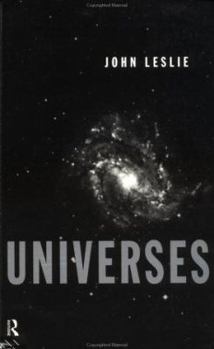Universes
Select Format
Select Condition 
Book Overview
First published in 2002. Routledge is an imprint of Taylor & Francis, an informa company.
Format:Hardcover
Language:English
ISBN:0415041449
ISBN13:9780415041447
Release Date:November 1989
Publisher:Routledge
Length:240 Pages
Weight:1.00 lbs.
Dimensions:0.8" x 5.7" x 8.8"
Customer Reviews
2 ratings
The DEFINITIVE book on the Anthropic Principle
Published by Thriftbooks.com User , 24 years ago
This book is truly wonderful. Not only that, it is perhaps the only book that I know of that is endorsed by BOTH atheists and theists alike. Yep, that's right boys and girls. Quentin Smith is one of the most die hard atheists on the planet and Peter Van Inwagen of the university of Nortre Dame is one of the biggest defenders of theism. Both rave about this book and their comments can be read on the back cover. So, what is this book all about, you ask? Well, it's something known as the Anthropic Principle. It was first introduced in the early 1970s by a physicist by the name of Brandon Carter. It basically states that we are not just lucky to be here, but rather we are REALLY REALLY REALLY REALLY lucky to be here. Why? Because from the first instant of the big bang onward, an incredible and highly improbable slew of things HAD to go right in order for the possibility for life to exist anywhere in the universe. So much so that it seems that the universe was "fine tuned" just for life. Sir Fred Hoyle (an atheist) was led to comment that the universe looks like a "put up job." Now, this set of circumstances led to a ressurection of the Argument from Design by the theists with renewed vehemence. Meanwhile, the atheists have their own responses, which basically take up two camps. First Response (also known as the Weak Anthropic Principle or WAP): "Of course the universe has laws which allow life to exist. If they didn't we would not be here. Therefore, the odds are irrelevant except perhaps for some latenight philosophic mental gymnastics." Now, there is a problem with this response in that it is nothing more than a tautology. That is to say, it does not EXPLAIN why the universe supports life despite so many constricted laws of physics and chemistry. It is like someone asking why the Dallas Cowboys won the superbowl and having a person respond "because they scored more points than the other team." That answers nothing. The question is: WHY did they win? Were they better than the other team? Did they get lucky? Did they have a better coach? Did the other team have injuries? Were turnovers a factor? etc. etc. Saying that "they scored more points" only states the obvious: "of course they scored more points, or else they would not have won the game..." Now, the second camp is known as the Strong Anthropic Principle (SAP) and it goes something like this: "Since the odds of our existing in a universe with the PRECISE physical laws necessary for us to do so are so slim as to be intellectually unacceptable (in the order of 10^10^123 according to Roger Penrose) there must then be a whole slew of other universes (perhaps an infinite number) to JUSTIFY this one. That is to say, in an infinite number of universes, virtually anything can happen. The majority of them would have random, weird laws of physics and be lifeless but EVERY SO OFTEN you would get one which could support life (in some
Cosmology made Fun and Exciting
Published by Thriftbooks.com User , 26 years ago
Philosophy professor John Leslie does a supurb job of presenting evidence that our cosmos may have been "fine-tuned" for life. The basic argument is that a life-premitting cosmos requires the existence of a very large number of highly specific and seemingly unrelated facts. Were any of these facts changed even modestly, life could have never have arisen. Further, since the probability of all the facts being what are is thought to be vanishingly small, some have suggested that our cosmos may have been "fine-tuned" for life. For some this has seemed a strong argument for the existence of God. But Leslie points out that an equally good explanation is that our portion of the cosmos is only a small part of a vast Universe. The great majority of this Universe is disorded and non-life-premitting, but entirely by chance some portions are life-premitting. That we see a life-permitting cosmos should come as no surprise, because mere chance indicates that at least some areas should be life-premitting and we can exist only in these areas. While Leslie's work is fun and exciting, and while Leslie clearly knows a great deal about physics and cosmology, from a philosophical perspective some of his conclusions seem a bit naive. For example, he defends a bizarre neoplatonic notion that a life-premitting Universe may exist solely because its existence is ethically required, i.e. that an abstract ethical principle may somehow have created everything. While this is a possible cosmogony perhaps on par with the God hypothesis, its implausable nature seems to suggest that we adopt a healthy skepticism about the ultimate origins of the Universe rather than seriously entartain it as a possibility. Leslie also makes some unwarranted assumptions about the possibility of alternative laws of nature. Nonetheless, the book is fun and informative. I highly recommend it. --Greg Klebanoff





